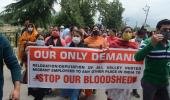At the moment, there appears to be no alternative political narrative to the one lying buried under the debris of havoc caused on this front by the fallout of 'August 5, 2019', asserts Mohammad Sayeed Malik, the distinguished commentator on Kashmir affairs.

Three years after the erstwhile (notionally) 'semi-autonomous' Jammu and Kashmir state was physically cut to its existing size and stature, no concrete alternative mainstream political narrative has so far emerged to replace the one that had prevailed since 1947 but was rendered obsolete in 2019.
The main dividing line in public discourse till then was that between political forces supporting the state's accession brought about with morally crucial popular support from Sheikh Abdullah in 1947 and those opposing it.
Sheikh Abdullah's unceremonious dismissal from power on August 9, 1953 caused distortion in the narrative, but its basic contours remained largely unchanged.
Post-August 5, 2019, political narrative lost relevance and fell into disuse.
More so, in the face of a strident ideological discourse, inevitably with sectarian overtones.
Distinct lines of division between pro-accession and anti-accession forces (alias separatists) on the ground are obscure today.
Politico-ideological barriers seem to have yielded place to shared sense of hurt across the board.
Characteristically, the mainstream narrative in J&K since 1947 and till three years ago was predominantly secular in its spirit as well as in popular expression.
A qualitative change in this particular feature of the state politics is stridently noticeable since 2019.
At the surface level, the earlier 'stink' cohabiting with the BJP is wearing out.
That is because all the mainstream players -- the National Conference, the Peoples Democratic Party and the Peoples Conference -- have been BJP's bed-fellows from time to time.
A new combination of forces with a pronounced pro-BJP tilt has come about with splinter elements cannibalised mainly from the PDP and NC.
Arrayed on its opposite side are constituents of the Gupkar Alliance whose main components are the two erstwhile ruling parties -- the NC and PDP.
However, at the moment their role and activities seem to be largely superficial.
Simmering discontent under the surface is palpable enough to put a question mark over the actual mass base of all the combatants.
However, in closer comparison, the hurt sentiment down below seems to be tilting towards the dispossessed -- the NC and the PDP.
That much was evident in the last trial of strength when district development board elections were held and the Gupkar Alliance had got the better of their New Delhi-blessed rivals.
At the moment, there appears to be no alternative political narrative to the one lying buried under the debris of havoc caused on this front by the fallout of 'August 5, 2019'.
Political and ideological forces spearheading the pre-2019 narrative find themselves with their back to the wall.
Till three years ago they were able to counter the separatist narrative with a potent secular nationalist theme which was consumed by the shock and awe of the erstwhile state's dismemberment compounded by its downgraded constitutional status.
The politico-ideological narrative of 1947, though disfigured in August 1953 when Sheikh Abdullah was unceremoniously dragged out of power, imprisoned and pushed into over two decades long wilderness, has vanished into thin air.
Its proponents are left with nothing to salvage from the wreckage and, in fact, they find no viable political line to 'sell'.
Occasional recourse to the old theme simply doesn't inspire anymore.

Normally, the final report of the Delimitation Commission announced a couple of months ago ought to have stirred a vibrant public discourse as re-arrangement of assembly constituencies has substantially tilted the inter-regional balance.
But nothing of that sort happened. For sure, a symptom of deep estrangement down below.
Out of the seven new assembly seats created in the delimitation process, six have gone to Jammu and one to the Valley.
This single change has upset the balance of forces with yet-to-be perceived implications on the ground.
Absence of any reaction or response doesn't mean the issue is accepted as a fait accompli.
Those with their ears to the ground can sense the deafening silence.
Those who understand the nuances of complex Kashmir politics feel that this factor has the potential of resurfacing sooner than later.
For historical reference: Accumulated ire against Sheikh Abdullah's overthrow in 1953 found its explosive expression, ten years later, in 1963 when the edifice of the Bakshi (Ghulam Mohammad) regime was dismantled brick by brick in the wake of the unconnected Holy Relic agitation.
No doubt, much has changed since then and especially after August 5, 2019 and some of the old precedents might not be any more a valid reference.
But deep down the sentiment does show symptoms of ominous uneasiness.
An instance being that the district level development board elections held after 2019 saw the so-called Gupkar Alliance of 'dispossessed' political groups -- the National Conference and the Peoples Democratic Party -- coming up with surprisingly impressive score.
It is, however, a different question, that those gains were crudely 'neutralised' under poorly disguised administrative coercion.
In my own opinion, that 'unforeseen' occurrence, favouring the 'Gupkar Gang' was more in spite of them than because of them.
Rightly or wrongly, the impression is that the ideology-driven BJP is manipulating to virtually de-politicise Kashmir.
At the moment the entire business is being conducted by the bureaucracy and the security apparatus.
Political players on both sides of the democratic divide are perceived to be engaged in shadow boxing.
Both the survivors of the old political order -- the NC and the PDP -- have been in the firing line of 'New Delhi'.
On the one hand their cadres are being pinched to reinforce the pro-establishment political outfits and, on the other, their beleaguered leadership is under sustained pressure to relent and fall in line.
The holding power of Farooq Abdullah and Mehbooba Mufti remains under constant strain.
The Centre's stunning action on August 5, 2019 has drastically upturned the state's political ground.
The old discourse, the old narrative all have vanished into thin air.
Three years down the line, the situation on the ground remain amorphous -- for all the actors.
Stray talk about impending assembly elections is becoming louder.
The contenders would have no option but to jump into the fray.
Also, restoration of the statehood to the Union Territory is in the air. Whether that happens and when is anyone's guess.
But one thing seems to be certain at this point in time: the new state structure, if and when it comes about, is going to be qualitatively different from that which was unceremoniously demolished three ago.
That prospect rules out the possibility of any kind of 'internal autonomy', much less a 'special status' being revived under the impending scheme; notwithstanding the cry in wilderness mainly by the Gupkar Alliance.

Speculation in the air suggest two main features: One that the new structure is more likely to be something nearer to the 'Delhi state' model and secondly that the new ruling setup in J&K would have a 'Jammu face' rather than a 'Kashmiri face' that ruled the roost from 1947 to 2018.
The latter is now history, going by the available politico-ideological indicators on the ground.
Even so, a comprehensive political narrative is missing. If anything, the ideological hue of the discourse is getting more strident as speculation about the impending assembly polls gains momentum.
Old slogans of 'autonomy' and 'special status' have faded out.
Erstwhile mainstream politics stands bereft of its propellers.
The resultant vacuum, going by the known history of the erstwhile state's recent past, carries inherent ominous portents.
From 1947 to 1953, the political narrative hinged in the theme that India's only Muslim majority state had voluntarily endorsed the accession, contrary to run of events, in return for Constitutional safeguards for its internal autonomy.
A popular slogan conveyed its message: 'jis Kashmir ko khoon se sencha, woh Kashmir hamara hai (nourished with our blood, Kashmir belongs to us).'
Sheikh Abdullah's dismissal from government in 1953 destroyed its living symbol.
Yet the narrative survived albeit in its downsized version; from 'equal partnership' to 'upholding special Constitutional status guaranteed under Art 370'.
A new slogan found popular appeal: 'Teen sau sattar chon izzat, miyon izzat (Article 370 is your honour, my honour).'
Until it actually happened and hit like a bombshell three years ago, sanctity of that position and the message behind the slogan was taken for granted.
Post-2019, nothing worth salvaging was left to sustain the theme of a national mainstream narrative. And nothing has come about since then.
Political entities surviving on the demolished theme song find themselves hamstrung, apparently for a long, long time, to come, if not forever.
For the moment, surface level high-decibel acrimony, mainly between friends-turned-foes, looks to be serving the immediate purpose of a political narrative. And they do it with great relish.
Deserters from the NC and the PDP sound louder than others in the fray.
Feature Presentation: Aslam Hunani/Rediff.com










